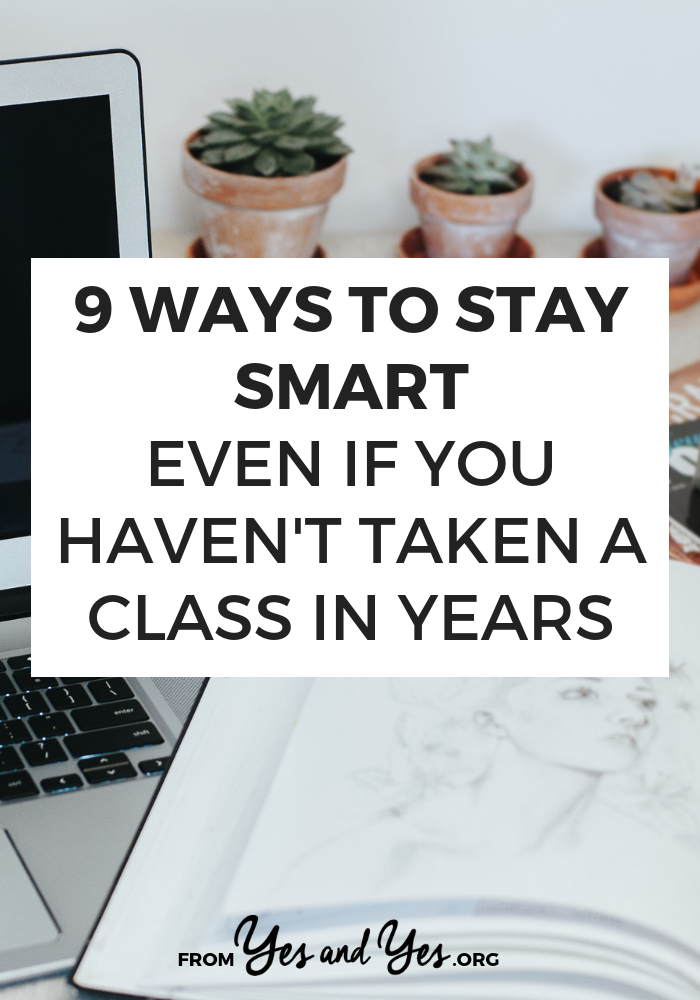
Have you ever seen that tv show Are You Smarter Than A Fifth Grader?
It is, by and large, an exercise in realizing that you now know nothing about history, science, or math.
How many cups are 28 fluid ounces?
Between 1455 and 1485, the War Of Roses took place in what country?
A common type of radio wave is referred to as VHF. What do those letters stand for?
I DON’T KNOW OKAY. But I can definitely tell you the full name of Instagram sensation Tuna Melts Your Heart!
As kids head back to school, I am more motivated than ever to stretch and build my brain so I’m not stumped when my 12-year-old stepson quizzes me about the difference between genus and species.
9 ways to stay smart even if you haven’t taken a class for years
1. Listen to smarty-pants podcasts
Real talk: I love Jordan Jesse Go as much as the next human. While it makes me laugh (so much!) it doesn’t do much to increase my grey matter.
What if we all committed to listening to a podcast about a topic that interested us but we didn’t know much about?
A few suggestions:
2. Host an article club
Are book clubs awesome? They sure are!
But finding four or more people who
- have the time/interest to read a whole book each month
- can get together at the same time
- want to discuss the book (not just gossip and drink wine)
Is damn-near impossible.
Enter: article club! Easier than book club, just as fun.
Members take turns choosing a topic and then sourcing two or three articles on that topic. It usually only takes an hour or two to read all the articles. You still stimulate your brain and have riveting conversations, but you’re not devoting two weeks to reading a novel you don’t actually like.
3. Literally steer conversations in smarter, more interesting directions
Left to my own devices, I would probably talk exclusively about memes, Brooklyn 99, and which weird recipe I cobbled together today. And those are perfectly fine conversation topics!
But if you started talking about cultural constructs of gender, I could hang. The same with neuroplasticity or the Romonovs or vegetarianism as a method to fight climate change. But I wouldn’t necessarily think to bring up those topics.
Imagine if we all decide to discuss smarter, more interesting things! I bet everyone at that backyard bbq would appreciate a break from talking about how their summer went or refinancing their house.
Related: 16 interesting, better small talk questions
4. Think about something for, like, a minute before you Google it
I am the captain of team Let’s Google It, but whatever happened to, say, trying to remember something? Or asking your conversation partners if they know the capital of Malaysia or which Australian prime minister went missing?
It’s good for us to try to remember things, to comb the folds of our brains for 20 seconds before we reach for our phones. It’s nice to give our trivia-loving friend a moment to shine and enlighten us with crazy tale of Harold Holt.
5. Join a Meetup group
It’s one thing to listen to brain-boosting podcasts during our commute, but we can turn it to 11 by discussing our favorite topics. Discussing anything makes us a jillion times more likely to retain information and it’s fun!
There are Meetup groups for just about any topic – philosophy, behaviour analysis, geopolitics, Myers-Briggs, astronomy. And Meetup groups help us make new friends and connect with people outside our normal social and professional circles – a win/win!
6. Take an online class
The internet is thick with online courses and ebooks – ranging from $17 workbooks to $2,500 masterminds.
But sites like Udemy and Skillshare make it super easy (and cheap!) to learn something new. And since their classes are insanely affordable, you don’t have to limit yourself to ‘sensible’ topics like ‘learning Excel Pivot Tables’ or ‘Introduction to Solidworks.’
Personally, I want to learn about flower arranging, how to give a professional back massage, and iphone food photography.
When you join Skillshare Premium right now, you can get two months free!
7. Take a Community Ed class
If you know that you learn best IRL, in groups, with the accountability of weekly class meetings, Community Ed is for you.
With ridiculously low prices and sweet, patient, local teachers, Community Ed classes are The Actual Best. Without exageration, I have dogearred no fewer than 15 classes in this Fall’s Minneapolis Community Ed catolog. Ballroom Dancing Level One, watch out! Kenny and I are about to step on each other’s feet and laugh nervously in your presense!
Community Ed offers traditional ‘intellectual’ classes like art history and math refreshers, but it also offers language, hobby, real estate, and professional development courses.
Before you drop hundreds of dollars on a conference or a consultant, why not spend six weeks and $35 on an introductory level course through Community Ed? You can double check your interest and you might find that you don’t even need that expensive class!
8. Add a new radio station to your car stereo
I love few things more than music with nonsense lyrics sung by 22-year-olds and autotune.
But, again, this isn’t necessarily doing much to increase my brainpower. Though I can absolutely recite all the lyrics to Justin Bieber’s ‘Sorry’ if you need me to!
I’m not suggesting we all need to give up Top 40 radio. But what if we added one news station to those programmed buttons in our dashboard? And when there was an ad break between the new Selena Gomez single and that ubiquitous song about God is a woman, we popped over to NPR for two minutes?
Painless and brain-expanding!
9. Join a Facebook group or online forum about a topic that interests you
If you can’t find a Meetup group that covers your interests or it’s hard to get out of the house, there’s a Facebook group or an online message board for every topic, ever.
Want to talk about New Math? Renaissance art? Sociolinguistics? Culturally-bound syndromes? There’s a group for that! You’ll be able to dig even deeper into the topics that you love and chat with people who are equally enthusiastic.
Pro-tip: if you’re already listening to a podcast about this topic, the podcast might already have a Facebook group you could join!
But I want to hear from you! Do you ever find yourself not knowing something you definitely learned in school? How do you stay intellectually active and curious? Tell us in the comments so we can try your methods!
P.S. Staying smart and working your brain is a habit you can build – just like brushing your teeth or stretching before bed. If you want to build more healthy habits, this will help! And it’s free!







I like the Google tip! We used to actually try to figure out a solution to our own questions back in the day. Google is waaay too convenient for our own good!
Charmaine Ng | Architecture & Lifestyle Blog
http://charmainenyw.com
I’m enjoying free membership (through my library – yay library!) to Lynda.com tutorials. Right now I’m watching Microsoft Office tutorials to help me pass certification exams. I’m learning all kinds of new things about Word, Excel, etc., and keeping myself valuable in my job field (executive assistant) too. Love this article with all learning tips!
Yes! I love Lynda! And it’s SO GREAT that it’s free!
I’m so guilty of googling everything, and have been attempting recently to stop for at least 5 minutes before googling something i know I KNOW.
Also, some more podcast suggestions: Science Vs, Freakonomics Radio, and Planet Money! They’re all relatively short, podcasts for learning, that are fun to listen to 🙂
Finally, teaching can keep you smart! I learn tons from my students!
I’m a college student but I still think these are great tips. Loved the reminder to think about something before googling … having so much information at your fingertips makes it hard to use your brain sometimes. 🙂
Laura & Bailey | https://cavapaws.com
Agree 100%! Whenever I read an article or listen to a podcast on a topic I know very little about I find myself thinking, “oh yeah, I love learning! Why don’t I try to do more of this?”
I think podcasts are a great way to learn new things while you go about your regular business. One of my favorites right now is Ologies, which is a really fun science podcast. I always learn so much and find myself enjoying it even if I *didn’t* think I was interested in that week’s topic.
I’ve taken classes through FutureLearn, which has free or a pay-for-certificate options. I have a 45-minute commute in the car and have found audiobooks are a great way to expand my world. Even if you’re a mystery junkie like me, you can learn tons about different cultures and parts of the world.
I love your tipps, but I have a big BUT to through in:
You don’t know where the War of Roses took place (England, I guess?) because it’s not relevant to your life. Maybe you learnd all that stuff in school, but let’s be honest: There is a reason why you forgot.
You and me and all of us are already very smart people, the Smart of a financial coach is just a very different Smart from the Smart of a fashion designer. The Fifth Grader may be able to tell you the shoe sizes of all 18th-century-US-presidents and it might even proof to be useful for them. You, on the other hand, might not be able to name even one president from the 18th century, but you know about Google Ads. Does that make them smarter than you? Does it make you smarter than them? I don’t know.
Of course there are a ton of things we could know and a lot of things we should know about (Politics! Taxes! How to buy a car! How not to be an a*hole!), but knowledge is only valuable when put into use. If information is not useful and/or not used, your brain will treat it as clutter or spam. (It was England. No idea why my brain kept that information)